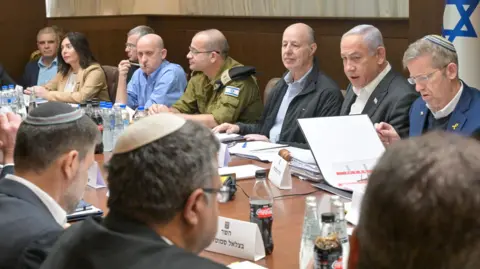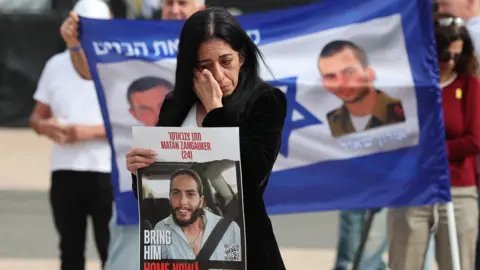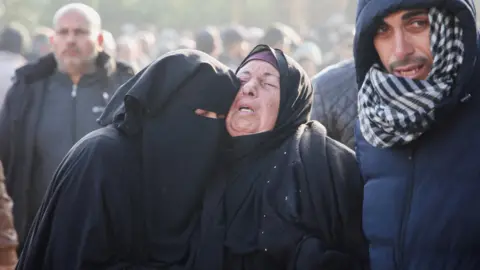 Israeli government press office
Israeli government press officeIsrael's government has approved a new Gaza ceasefire and hostage release deal with Hamas, paving the way for it to come into force on Sunday.
The decision came after hours of discussions that lasted late into the night. Two far-right ministers voted against the deal.
The security cabinet earlier recommended ratification of the agreement, saying it “supports the achievement of the war's objectives,” according to Prime Minister Benjamin Netanyahu's office.
It came hours after the prime minister's office and Hamas said they had finalized details of the deal, two days after it was announced by brokers Qatar, the US and Egypt.
Under the agreement, 33 Israeli hostages still held by Hamas in Gaza after 15 months of conflict will be exchanged for hundreds of Palestinian prisoners in Israeli jails during the first phase, lasting six weeks.
Israeli forces will also withdraw from densely populated areas of Gaza, displaced Palestinians will be able to begin returning to their homes and hundreds of aid trucks will be allowed into the territory each day.
Talks on the second phase – which should lead to the release of the remaining hostages, the full withdrawal of Israeli troops and the “restoration of sustainable calm” – will begin on the 16th.
The third and final stage will involve the recovery of Gaza – something that could take years – and the return of any remaining bodies of hostages.
Qatar said the hostages to be freed during the first phase would include “civilian women, female soldiers, children, the elderly and sick and wounded civilians”.
Israel says three hostages are expected to be freed on the first day of the ceasefire, with more small groups to be released at regular intervals over the next six weeks.
The Israeli military launched a campaign to destroy Hamas – which is banned as a terrorist organization by Israel, the US and others – in response to an unprecedented cross-border attack on October 7, 2023, in which around 1,200 people were killed and 251 taken hostage.
More than 46,870 people have been killed in Gaza since then, according to the Hamas-ruled territory's health ministry. Most of the 2.3 million people have also been displaced, with widespread destruction and severe shortages of food, fuel, medicine and shelter due to the struggle to get aid to those in need.
Israel claims 94 of the hostages are still being held by Hamas, of whom 34 are believed to be dead. In addition, there are four Israelis who were kidnapped before the war, two of whom are dead.
 EPA
EPABefore the Israeli government's vote on the deal, Culture Minister Miki Zohar of Netanyahu's Likud party said: “This is a very difficult decision, but we have decided to support it because it is very important for us to see all our children, men and women back to home.”
“We hope that in the future we will be able to complete the work in Gaza,” he added.
But far-right National Security Minister Itamar Ben-Gvir said he was “appalled” by the details of the deal, including that “life-sentenced terrorists” would be released in exchange for the hostages, and called on other ministers to join him in the vote against him.
On Thursday, Ben-Gvir announced that his Jewish Power party would leave the ruling coalition if the deal is approved. But he said he would not topple the government in parliament and would return “if the war against Hamas resumes in full force”.
Finance Minister Betzalel Smotrich, another far-right politician opposed to the deal, said his Religious Zionism party would withdraw if the war did not resume after the end of the first phase.
The three-phase structure has also caused division and anxiety among some of the hostages' families. They fear that their relatives will be left behind in Gaza after the first phase is completed and are demanding that the government ensure that the second and third phases are also implemented.
“For 469 days our loved ones were left in captivity and now there is finally hope,” said Einav Zangauker, whose 25-year-old son Matan was abducted from Kibbutz Nir Oz.
“This agreement must be respected to the end to bring everyone home and end the war. Ending the war, bringing everyone back and getting back to normal is in Israel's interest.”
 Reuters
ReutersA government vote was expected on Thursday, but the meeting was postponed after Netanyahu accused Hamas of failing to honor parts of the deal, a claim Hamas denied.
In the early hours of Friday, the prime minister's office announced that Israel's negotiating team in Doha had finalized the agreement.
Hamas also issued a statement saying “obstacles” over the terms of the deal had been resolved by dawn.
A source close to Hamas told AFP that the first three hostages to be freed would be women.
On Friday, Israel's Justice Ministry released a list of 95 Palestinian prisoners it said would be part of the first group to be released in exchange for hostages. They consist of 69 women, 16 men and 10 minors, according to AFP.
 Reuters
ReutersA meeting was also held in Cairo on Friday to discuss the mechanisms for implementing the deal, a senior Egyptian official told the BBC.
All necessary arrangements have been agreed, including the formation of a joint compliance operations room that will include representatives from Egypt, Qatar, the US, Palestine and Israel, the official said.
Egypt's state-run Al-Qahera News TV also quoted a source as saying they had agreed to facilitate the entry of 600 humanitarian trucks a day during the ceasefire.
That would require a more than 14-fold increase from the UN-reported daily average of 43 trucks in January. But Rick Piperkorn, the World Health Organization's representative in Gaza, said “the possibility is very strong” if the Rafah crossing with Egypt and other crossings were to open.
The WHO also plans to deliver a number of prefabricated hospitals to support the devastated health sector. Half of Gaza's 36 hospitals are not functioning, while others are only partially functional.
There has been no respite for Palestinians on the ground in Gaza since the cease-fire agreement was announced on Wednesday evening.
The Hamas-run Gaza Civil Defense Agency said a total of 117 Palestinians, including 32 women and 30 children, had been killed by Israeli strikes since then.
Tamer Abu Shaaban said his young niece was killed by rocket shrapnel while she was playing in the school yard in Gaza City, where her displaced family was sheltering.
“Is this the truce they are talking about? he told Reuters as he stood next to her body in the morgue. “What did this young girl, this child, do to deserve this?”
Israel's military said on Thursday afternoon that it had struck 50 “terrorist targets” in Gaza in the previous day and had taken steps to mitigate civilian casualties.

